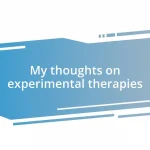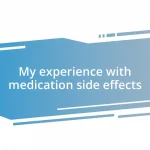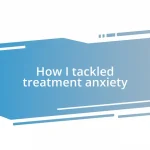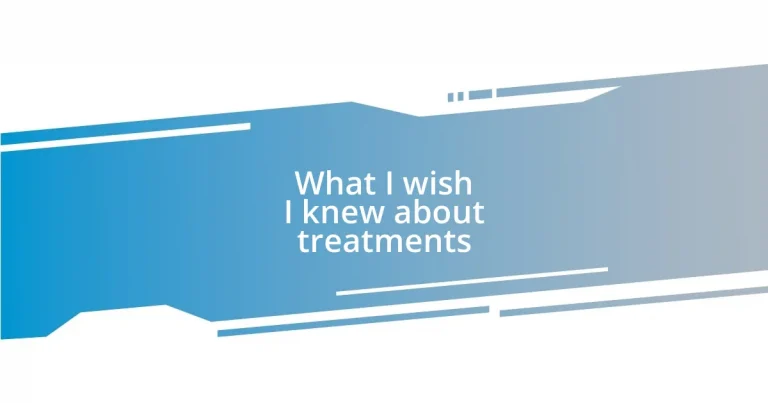Key takeaways:
- Understanding treatment options can be overwhelming; exploring various therapies can lead to more personalized and effective care.
- Common misconceptions include the belief that all treatments work the same for everyone and the idea that natural remedies are always safe.
- Personalized treatment plans enhance patient engagement and adherence, adapting as the patient’s needs change.
- Utilizing reputable medical resources and connecting with support groups can provide valuable insights and empower treatment decisions.
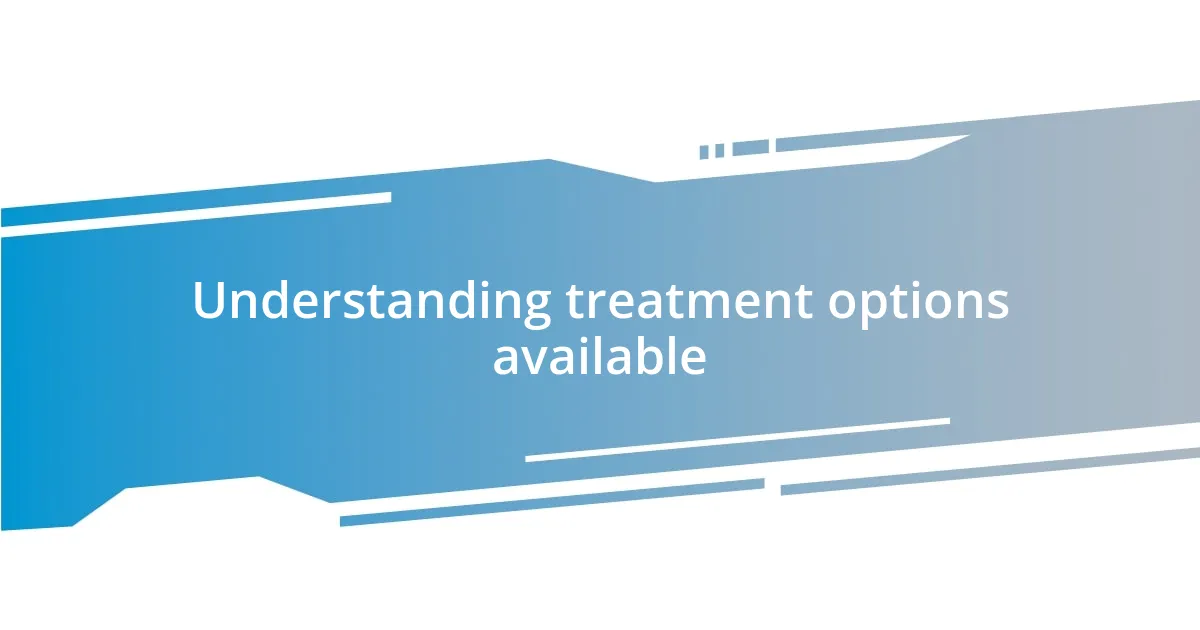
Understanding treatment options available
Understanding the treatment options available can often feel overwhelming, especially when you first receive a diagnosis. I remember sitting in the doctor’s office, feeling lost and anxious as they listed various treatments. Would this medication really help? It’s completely natural to wonder about the effectiveness of each choice.
Some treatments, like medication or therapy, may seem straightforward, while others like alternative therapies or clinical trials can feel obscure. I recall a friend who hesitated at the thought of participating in a trial, concerned about the unknowns. But, sometimes taking that leap can offer new hope and possibilities. Have you ever considered how you might explore these options more thoroughly?
It’s also crucial to reflect on the potential side effects and how they can impact your lifestyle. When I started a new treatment, the side effects were tough, and I wished I had prepared better. Each person’s experience varies, and understanding these nuances can empower you to make informed decisions. When weighing your options, ask yourself: what aligns best with my personal goals and values?
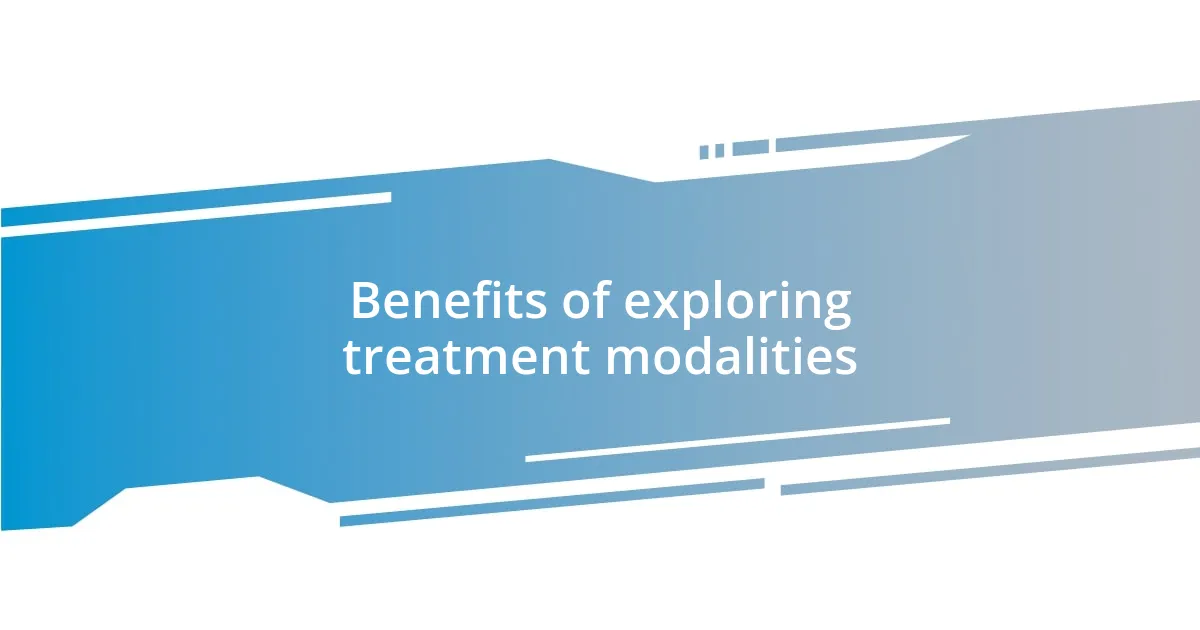
Benefits of exploring treatment modalities
Exploring different treatment modalities can open up a world of options that may not be immediately apparent. I remember my own journey; I discovered holistic treatments that were surprisingly effective alongside traditional medicine. This fusion of approaches allowed me to tailor my care to what felt best for me. Have you thought about how blending different treatments could enhance your experience?
Using multiple treatment modalities can also enhance your support network. I once joined a group of patients exploring various therapies, and it was enlightening to hear their stories. Sharing insights and experiences not only boosted my morale but also expanded my understanding of what might work for me. Aren’t we all looking for that balance between connection and healing?
Finally, exploring treatment options allows for more personalized care, aligning with your unique needs and lifestyle. I vividly recall a moment when I chose a treatment that not only treated my condition but also fit seamlessly into my daily routine. Each decision felt empowered, reminding me that my health journey is truly mine. Have you considered the ways personalized treatments could transform your approach to wellness?
| Type of Treatment | Potential Benefits |
|---|---|
| Traditional Medicine | Established protocols, often with predictable outcomes |
| Alternative Therapies | Holistic approach, addressing both physical and emotional well-being |
| Clinical Trials | Access to cutting-edge treatments and innovations |
| Combination Therapies | Customized care tailored to individual needs, possibly more effective |
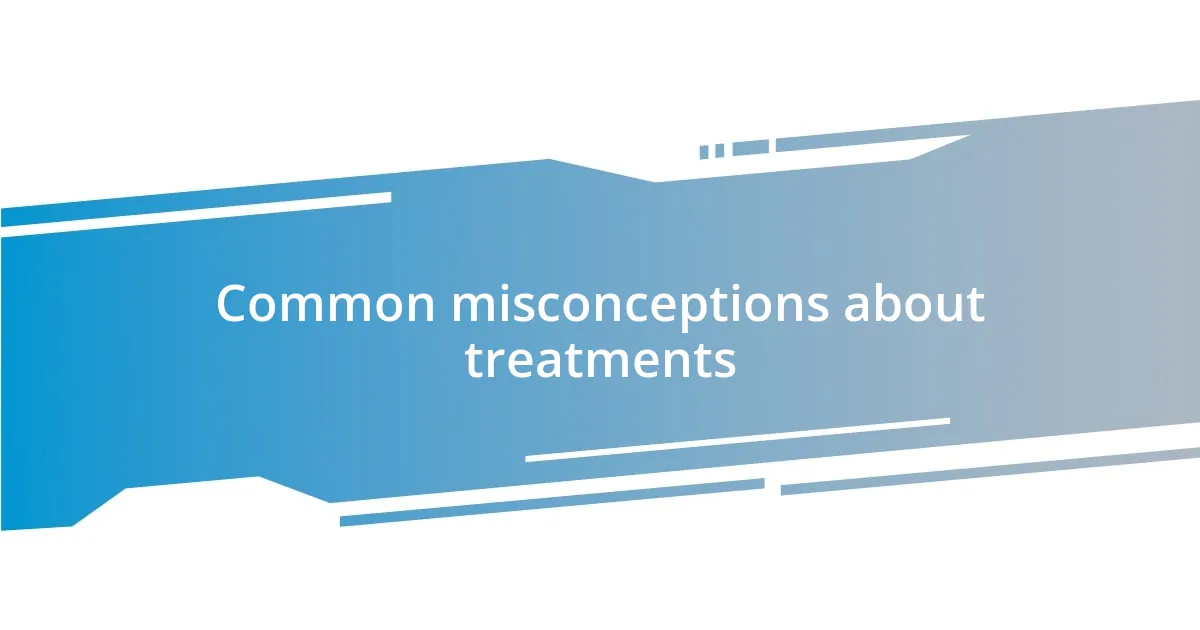
Common misconceptions about treatments
There are quite a few misconceptions surrounding treatments that I often encounter. For instance, many people believe that conventional medicine is always the most effective option. I used to think this way, but I learned through my own experiences that complementary therapies can provide significant benefits, especially for emotional relief. Additionally, the idea that clinical trials are only for those out of options is misleading; often, they offer cutting-edge treatments that aren’t available elsewhere.
Here are some common misconceptions about treatments:
- All treatments work the same for everyone: Everyone’s body responds differently. What alleviates symptoms for one person may not have the same effect on another.
- Natural means safe: Just because a treatment is labeled ‘natural’ doesn’t guarantee its safety or efficacy. I once tried a herbal remedy thinking it would be harmless, only to learn that it interacted poorly with my medication.
- You have to choose only one treatment method: I initially thought I had to commit to only one approach, but combining treatments can be beneficial. Mixing traditional and alternative therapies worked well for me and provided a more holistic approach to my health.
- If it’s not prescribed, it’s not worth trying: This notion can limit possibilities. Talking to health professionals about alternative methods can reveal valuable options beyond prescriptions.
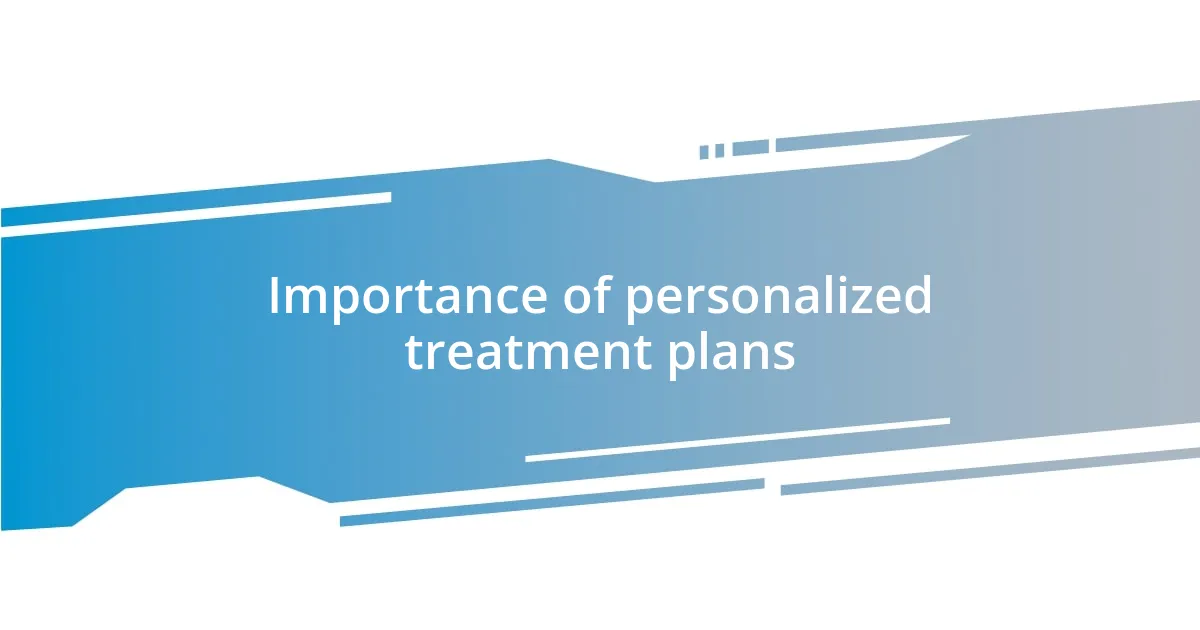
Importance of personalized treatment plans
Personalized treatment plans are crucial because they recognize that each individual is unique. I vividly remember when my doctor took the time to understand not just my symptoms, but my lifestyle, preferences, and values. This approach allowed us to create a treatment plan that was tailored to my needs, which made all the difference in my recovery. Have you ever felt that your treatment just didn’t resonate with who you are?
The power of personalized plans lies in their capacity to adapt as you progress. I experienced this firsthand after a few months of treatment when my doctor revisited our initial plan, adjusting it based on my feedback and ongoing results. This ongoing dialogue fostered a sense of ownership over my healing journey, reminding me that my input mattered. Don’t you think being an active participant in your care leads to better outcomes?
Moreover, personalized treatment plans can significantly enhance adherence to therapies. When I was choosing between medications, the option that aligned with my daily routine made it easier for me to stick to it. It sparked motivation rather than resistance. Isn’t it empowering when a treatment feels like it fits seamlessly into your life rather than feeling like an obligation?
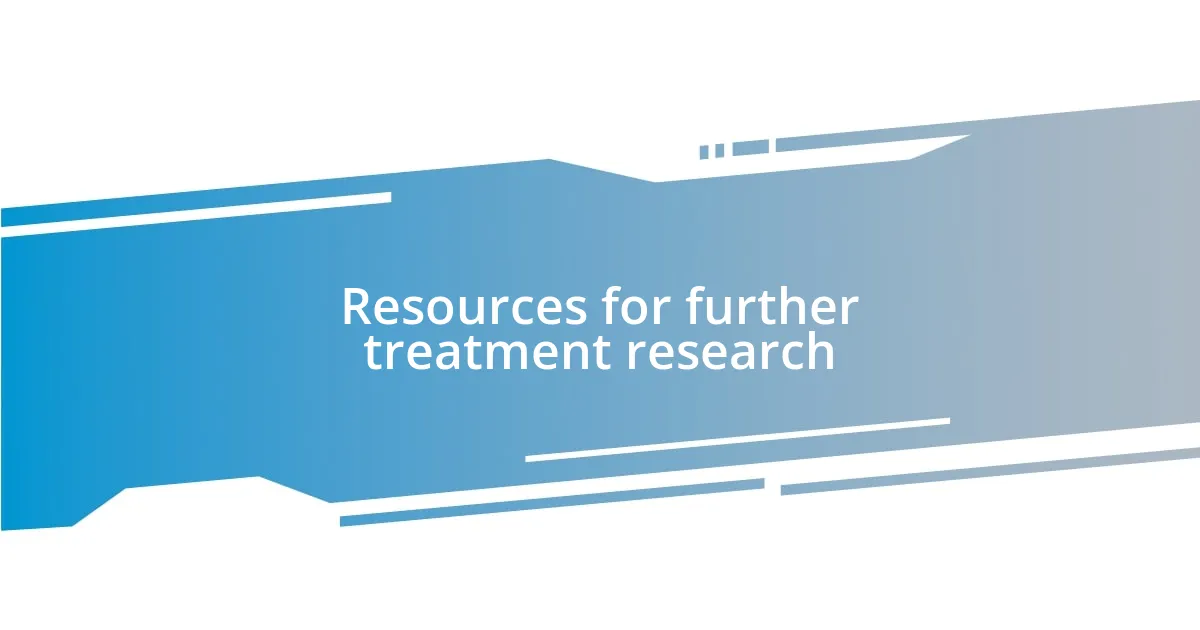
Resources for further treatment research
When it comes to exploring further treatment options, a wealth of resources can provide valuable insights. I always found that reputable medical websites, like Mayo Clinic and WebMD, are excellent starting points. They offer evidence-based information that’s easy to digest and can point you toward clinical trials, updates in treatment protocols, or even patient testimonials that may resonate with your journey.
Moreover, tapping into online support groups can be invaluable. I remember joining a forum for patients dealing with similar health challenges; it opened my eyes to alternative therapies and lesser-known resources. Hearing about others’ experiences gave me the courage to try a new approach, which ultimately led to positive changes in my treatment plan. Isn’t it interesting how shared stories can illuminate pathways we may not have considered otherwise?
In addition to online resources, I recommend connecting with local health organizations or community centers. They often host workshops or informational sessions that dive deeper into emerging treatments. Attending one of these workshops a few years ago not only broadened my understanding but also connected me with healthcare professionals I still reach out to for guidance. Have you ever thought about how engaging with your community can enrich your healthcare journey? It certainly has for me, making me feel less isolated and more informed.





